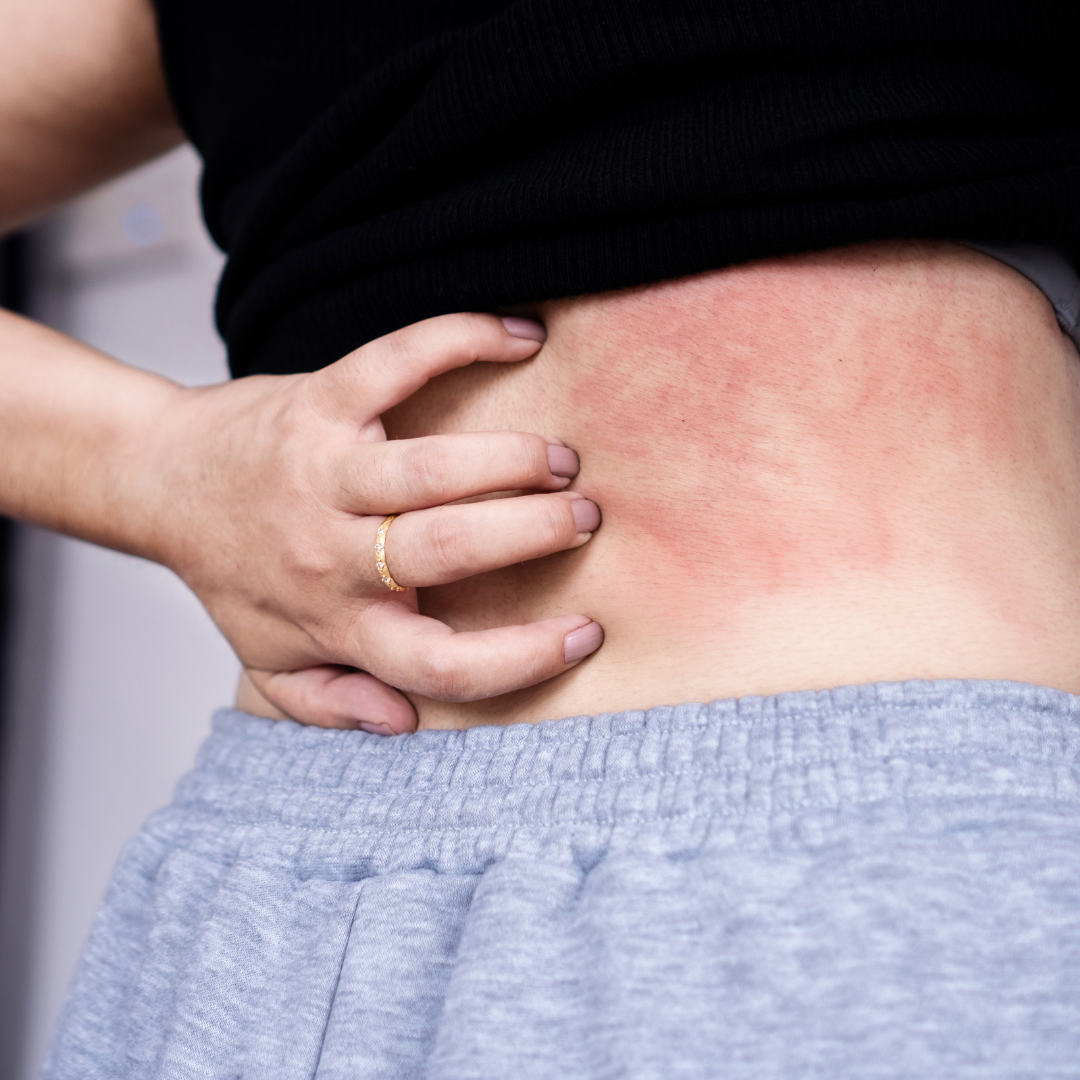How to Manage Histamine Reactions for Healthier Skin

What Is Histamine and How Does It Affect the Skin?
Definition and Function: Histamine is a chemical produced by the body during allergic reactions and inflammation (Reference 1, 4).
Skin’s Immune Response: The skin plays an active role in the body’s immune system. When histamine is released, it triggers symptoms like redness, swelling, and itching (Reference 4).
Histamine Receptors and the Skin: The skin has four types of histamine receptors (H1, H2, H3, and H4), each playing a distinct role in regulating inflammation and immune responses (Reference 3).
Impact on Skin Health: Histamine can exacerbate inflammatory skin conditions such as eczema, dermatitis, and urticaria (Reference 1, 2).
How to Choose the Right Skincare Products for Histamine-Related Skin Issues
- Opt for Gentle Cleansers and Moisturizers
- Use sulfate-free cleansers that won’t strip the skin of its natural oils.
- Look for moisturizers that contain soothing ingredients like aloe vera, colloidal oatmeal, or squalane to calm the skin and maintain hydration.
Managing Histamine in Skincare
Ingredients to Avoid in Skincare for Histamine-Reactive Skin
If you have histamine-related skin sensitivities or conditions like hives, eczema, or allergic dermatitis, it’s important to avoid certain ingredients that can irritate the skin or increase histamine release. Here are some key ingredients to watch out for:
1. Fragrances
Why Fragrances Can Be Problematic: Fragrances, both synthetic and natural, are one of the most common causes of skin irritation and allergic reactions. They can trigger histamine release in the skin, leading to increased redness, itching, and inflammation (Reference 5).
Impact on Histamine-Reactive Skin: For individuals with sensitive or histamine-prone skin, fragrances can weaken the skin barrier, making it more susceptible to irritation and allergic reactions (Reference 5).
2. Harsh Exfoliants
Why Exfoliants Can Trigger Histamine Release: Physical exfoliants (scrubs) and chemical exfoliants (such as glycolic acid and salicylic acid) can irritate the skin by causing micro-tears or over-exfoliating the skin's surface. This can lead to inflammation and trigger histamine release, especially in sensitive or reactive skin (Reference 5).
Impact on Sensitive Skin: Over-exfoliation can weaken the skin barrier, making it more vulnerable to external irritants and increasing the risk of histamine-related reactions like itching and redness (Reference 5).
What to Avoid: Avoid harsh scrubs with large exfoliating particles and high concentrations of acids. Instead, use mild, non-abrasive exfoliants, such as polyhydroxy acids (PHAs), which are gentler on the skin.
3. Sulfates (Sodium Lauryl Sulfate, Sodium Laureth Sulfate)
Why Sulfates Are Irritating: Sulfates are commonly found in cleansers and shampoos to create lather, but they can be too harsh for sensitive skin. They strip away the skin’s natural oils, causing dryness, irritation, and compromising the skin barrier (Reference 9).
Impact on Histamine-Prone Skin: For individuals with histamine-related skin issues, sulfates can exacerbate dryness and trigger itching or redness, making conditions like eczema or dermatitis worse (Reference 9).
Alternatives: Look for sulfate-free cleansers that use gentler surfactants like cocamidopropyl betaine or decyl glucoside, which cleanse without stripping the skin (Reference 5).
4. Preservatives (Parabens, Formaldehyde Releasers)
Why Preservatives Can Be Harmful: Preservatives such as parabens, formaldehyde releasers (e.g., DMDM hydantoin, quaternium-15), and methylisothiazolinone are used to extend the shelf life of products but can also be skin irritants or allergens (Reference 5).
Impact on Histamine Release: These preservatives may irritate the skin, especially in those with sensitive or compromised skin barriers, leading to inflammation and the potential for histamine release (Reference 5).
5. Retinoids (Retinol, Retinoic Acid)
Why Retinoids Can Irritate: Retinoids, while effective for anti-aging and acne treatment, can cause peeling, dryness, and irritation in sensitive skin types, potentially triggering histamine-related reactions (Reference 9).
Impact on Sensitive Skin: Retinoids increase cell turnover, which can cause the skin to become more sensitive and reactive, especially when first introduced into a skincare routine. This may lead to redness, itching, and worsening of conditions like eczema or dermatitis (Reference 9).
Alternatives: For those with histamine-related skin concerns, it’s best to start with very low concentrations of retinoids or choose alternatives like bakuchiol (Babchi), a plant-based retinol alternative that is gentler on the skin (Reference 5).
Conclusion
In conclusion, managing histamine-related skin issues through skincare involves careful selection of products to avoid common irritants and allergens. Fragrance-free, and sulfate-free products, along with soothing and barrier-repairing ingredients, are essential for calming sensitive, reactive skin. By avoiding harsh exfoliants, preservatives, and focusing on gentle, hypoallergenic formulations, individuals with histamine-sensitive skin can better manage their symptoms and improve overall skin health.
References
- Histamine in the Skin: Its Role in Dermatitis and Inflammatory Responses, Journal of Investigative Dermatology.
- Histamine in Atopic Dermatitis: Mechanisms and Therapeutic Implications, Allergy, Asthma & Immunology Research.
- Histamine Receptors in Skin and Their Role in Itching and Inflammation, Journal of Allergy and Clinical Immunology.
- Skin Mast Cells: Histamine Release and Regulation in Skin Inflammation, Frontiers in Immunology.
- Histamine Intolerance: Effects on Skin Health and Potential Treatments, International Journal of Dermatology.
- The Role of Histamine in Psoriasis and Other Inflammatory Skin Diseases, British Journal of Dermatology.
- Histamine's Role in the Pathophysiology of Urticaria (Hives), Current Allergy and Asthma Reports.
- Cutaneous Reactions to Food: The Role of Histamine, Journal of Dermatology and Clinical Research.
- Topical Antihistamines in Dermatology: Efficacy and Safety, Clinical Dermatology.
- Histamine, Inflammation, and Skin Aging, Experimental Dermatology.



